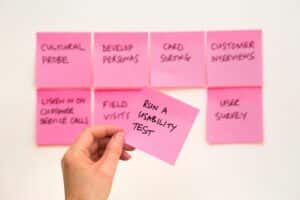Your HCM project: the keys to successful implementation
Imagine: you’re hosting a dinner party for 20 guests. You’ve reserved a sumptuous table, ordered exquisite dishes, and prepared a dream setting. Except… you didn’t ask if anyone was vegetarian, allergic to seafood, or hated mushrooms. The result: some leave hungry, others with indigestion, and everyone remembers your dinner… but not for the right reasons.
Well, that’s what happens when a company embarks on an HR transformation project without asking the right questions.
Whatever solution you choose (Workday, Oracle, etc.), here are 6 key questions to avoid your project turning into a nightmare!
Question 1 – Do HR and CIO functions speak the same language?
While the HR department focuses on the employee experience and process efficiency, the IT department focuses on security, maintainability and technical integration. Establishing mixed governance enables these complementary priorities to be reconciled. This approach contributed to the successful deployment of Oracle HCM in 2025 at a leading electrical equipment manufacturer.
Best practices: set up joint workshops right from the scoping phase, co-write strategic deliverables (e.g. specifications, change management plan) and provide “translators” between the two worlds, such as a hybrid HR/IT project manager.
Question 2 – Do I need a sponsor for a Human Capital Management project?
A project that succeeds without a sponsor is not a transformation project. This anthological rule is immutable. A big plus if the sponsor is a member of the EXCOM: he or she knows what’s at stake for the company and, thanks to his or her influence, will be able to support the project in difficult times.
For example, when Workday was deployed at a major French bank, the HR department sponsor helped to release an additional budget in just a few days to reinforce user support, thus avoiding an internal labor crisis.
Question 3 – How can you anticipate resistance to change in your HCM project?
Your guests won’t come back for your insect tartare? Perhaps they would have tried it with the right communication.
Even before starting the project, you need to identify the “targets” and players involved in the transformation.
Best practices: map stakeholders, organize focus groups to understand obstacles, and build a multi-channel communication plan (newsletter, videos, internal ambassadors). Some companies even go so far as to create dedicated Yammer/Teams communities where employees can ask all their questions.
Need an expert for your project?
Our experts support companies in defining and implementing effective governance for their transformation projects. Contact us to benefit from our methodology and turn your project into a success.

Question 4 – Do you have the talent to make a success of your human capital management project?
Running out of resources during a project can lead to your team overheating and major tensions with your integrator and sponsors.
Depending on its scale, an HCM project will mobilize between 3 and 20 FTEs (HR and IT) for several months, not counting the time users will spend in training. The scoping study will enable you to assess the resources required throughout the project.
One mistake could be to underestimate the resources required post go-live.
Yet runtime management is the key to ongoing HCM optimization, whether your solution is Oracle HCM or Workday. Upgrades, integration maintenance and user support require a dedicated team to ensure optimal ROI and lasting solution adoption.
Practical Council: plan for temporary reinforcements (interims, consultants, work-study students) to absorb the load on day-to-day HR operations. And don’t forget to include time for user testing, which is often underestimated, but critical to success.
Question 5 – Is governance clear and shared?
Governance defines the roles of all players, and its purpose is to guarantee rapid decision-making.
It’s a good idea to build on internal feedback.
Make sure you get your sponsor on board and don’t delegate too much to your integrator!
For example, a monthly steering committee with HR, CIO and EXCOM sponsor validates strategic decisions, while a weekly project committee manages operational issues. A shared RACI (who does what?) from the outset limits ambiguities.
Question 6 – How can you measure the success of your HCM project?
Depending on your company’s reluctance to finance the project, it may be useful to draw up a business case. The aim is to make the project’s financial stakes intelligible, in terms of costs and benefits.
Best practice: define concrete KPIs from the outset (tool adoption rate, reduction in payroll closing time, lower turnover). The most mature companies even include a post-deployment follow-up at 6 and 12 months to measure the real benefits and adjust the trajectory.
To make the most of your HCM solution, discover our methodologies and best practices for HR reporting, which will enable you to gain valuable insights from your data.
In conclusion
Turning your HCM project into a lasting success requires much more than just technical implementation. As we have seen, alignment between HR and IT, the support of an influential sponsor, anticipating resistance to change, mobilizing the right resources, clear governance and relevant indicators are the six essential pillars of your success.
When these fundamental questions are addressed upstream, you can avoid the usual pitfalls and maximize the value of your investment. Don’t forget that HCM projects transform much more than systems: they transform the way your employees live their daily lives. Governance is the common thread that links vision, resources and results.
Ready to write your own success story? Our experts are here to support you every step of the way. Contact us!
Need an expert for your HCM project?
Do you recognize yourself in these challenges? Transforming an HCM project is a complex process requiring expertise and methodology. Don’t hesitate to contact us for a personalized diagnosis of your HCM project and to benefit from the expertise of our teams.

34 HR innovations and trends for 2025
Discover the latest HR innovations and trends and accelerate your digital transformation.
Contact
A project? A request?A question?
Contact us today and find out how we can work together to make your company’s digital future a reality.











